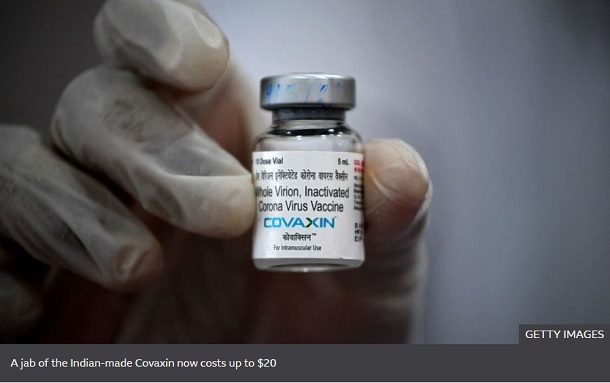
It took 31-year-old Sneha Marathe half a day to book an appointment online for a Covid vaccine.
"It was a game of 'fastest finger first'," she says. "The slots filled up in three seconds." But the hospital cancelled her slot at the last minute: they had no vaccines. Ms Marathe went back to try for another appointment.
All 18-44 year-olds in India have to register on the government's CoWin platform to get vaccinated. With demand for jabs far outstripping supply, tech-savvy Indians are even writing code to corner elusive appointments.
Ms Marathe can't code, but she is among millions of Indians who are on the right side of the country's digital divide - unlike hundreds of millions of others who don't have access to smartphones or the internet, currently the only route to a jab.
Prime Minister Narendra Modi's federal government has opened up vaccinations for some 960 million eligible Indians without having anything close to the required supply - more than 1.8 billion doses.
Worse, the severe shortage comes amid a deadly second Covid wave and warnings of an impending third wave.
A cocktail of blunders - poor planning, piecemeal procuring and unregulated pricing - by Mr Modi's government has turned India's vaccine drive into a deeply unfair competition, public health experts told the BBC.
How did the world's largest vaccine manufacturer, often dubbed "pharmacy of the world" for generic drugs, end up with such few vaccines for itself?
A piecemeal strategy
"India waited till January to place orders for its vaccines when it could have pre-ordered them much earlier. And it procured such paltry amounts," says Achal Prabhala, a co-ordinator with AccessIBSA, which campaigns for access to medicines in India, Brazil and South Africa.
Between January and May 2021, India bought roughly 350 million doses of the two approved vaccines - the Oxford-AstraZeneca jab, manufactured as Covishield by the Serum Institute of India (SII), and Covaxin by Indian firm Bharat Biotech. At $2 per dose, they were among the cheapest in the world, but not nearly enough to inoculate even 20% of the country's population.
Declaring that India had defeated Covid, Mr Modi even took to "vaccine diplomacy", exporting more jabs than were administered in India by March.
Contrast that with the US or EU, who pre-ordered more doses than they required nearly a year before the vaccines became available for immunisation.
"This guaranteed vaccine manufacturers a market, gave them certainty to forecast supply and sales, and ensured that some of these governments got large quantities as quickly as possible, once the vaccines were ready," Mr Prabhala says.
Unlike the US and the UK, India also waited until 20 April - well into the second wave - to extend a $610m financing line to SII and Bharat Biotech to boost production.
Another failure, according to Malini Aisola, co-convener of the All India Drug Action Network, was the decision not to enlist the vast swathe of India's manufacturing capabilities - biologics factories, for instance, that could have been repurposed into vaccine production lines.
Again, four firms, including three government-owned ones, have only recently been given rights to make Covaxin, which is partially publicly-funded.
On the other hand, by early April, Russian developers of Sputnik V, had inked manufacturing deals with a host of Indian pharma companies, which are set to produce the vaccine.

